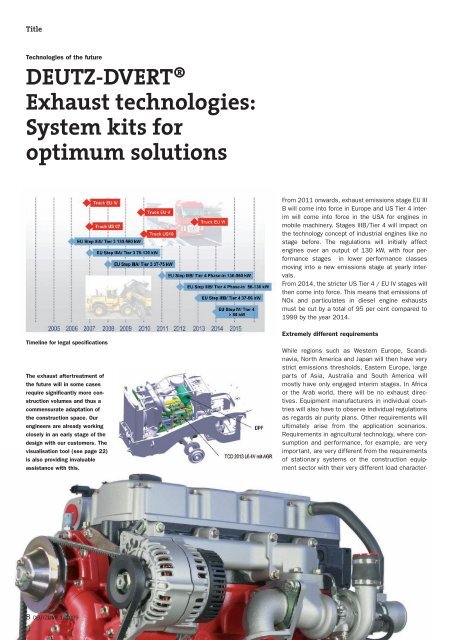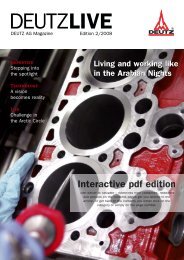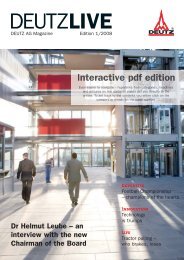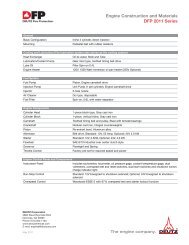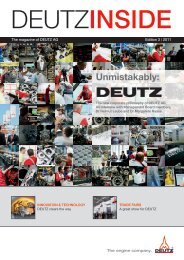deutz live 1/2009
deutz live 1/2009
deutz live 1/2009
You also want an ePaper? Increase the reach of your titles
YUMPU automatically turns print PDFs into web optimized ePapers that Google loves.
Title<br />
Technologies of the future<br />
DEUTZ-DVERT®<br />
Exhaust technologies:<br />
System kits for<br />
optimum solutions<br />
Timeline for legal specifications<br />
The exhaust aftertreatment of<br />
the future will in some cases<br />
require significantly more construction<br />
volumes and thus a<br />
commensurate adaptation of<br />
the construction space. Our<br />
engineers are already working<br />
closely in an early stage of the<br />
design with our customers. The<br />
visualisation tool (see page 22)<br />
is also providing invaluable<br />
assistance with this.<br />
8 DEUTZLIVE 1/<strong>2009</strong><br />
From 2011 onwards, exhaust emissions stage EU III<br />
B will come into force in Europe and US Tier 4 interim<br />
will come into force in the USA for engines in<br />
mobile machinery. Stages IIIB/Tier 4 will impact on<br />
the technology concept of industrial engines like no<br />
stage before. The regulations will initially affect<br />
engines over an output of 130 kW, with four performance<br />
stages in lower performance classes<br />
moving into a new emissions stage at yearly intervals.<br />
From 2014, the stricter US Tier 4 / EU IV stages will<br />
then come into force. This means that emissions of<br />
NOx and particulates in diesel engine exhausts<br />
must be cut by a total of 95 per cent compared to<br />
1999 by the year 2014.<br />
Extremely different requirements<br />
While regions such as Western Europe, Scandinavia,<br />
North America and Japan will then have very<br />
strict emissions thresholds, Eastern Europe, large<br />
parts of Asia, Australia and South America will<br />
mostly have only engaged interim stages. In Africa<br />
or the Arab world, there will be no exhaust directives.<br />
Equipment manufacturers in individual countries<br />
will also have to observe individual regulations<br />
as regards air purity plans. Other requirements will<br />
ultimately arise from the application scenarios.<br />
Requirements in agricultural technology, where consumption<br />
and performance, for example, are very<br />
important, are very different from the requirements<br />
of stationary systems or the construction equipment<br />
sector with their very different load character-


